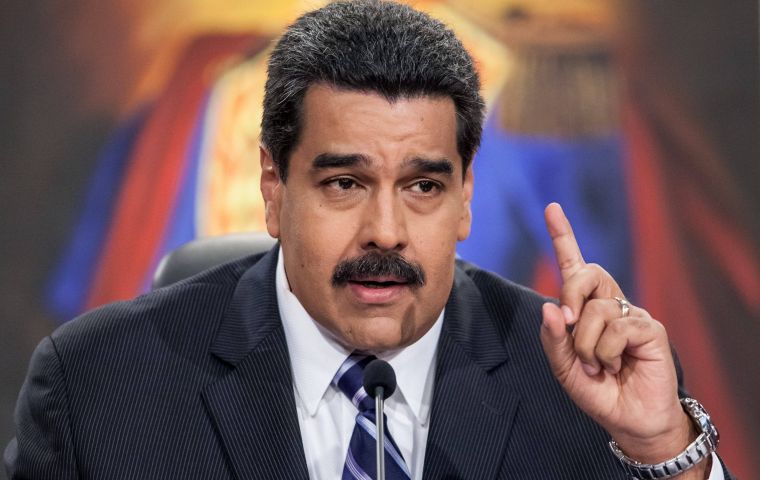MercoPress. South Atlantic News Agency
Venezuela to hold commune elections this weekend
 Maduro also agreed with a bill whereby those who disregard court rulings in his favor cannot participate in electoral processes
Maduro also agreed with a bill whereby those who disregard court rulings in his favor cannot participate in electoral processes The Venezuelan regime of President Nicolás Maduro heads for Sunday's commune elections with the results of the July 28 presidential polls questioned by about half of the world's governments. Communes are new forms of social organization based on self-management, Agência Brasil explained. There are 4,500 of them nationwide. Communal councils are some sort of permanent popular assemblies of residents of a neighborhood or rural area.
Maduro has argued that this election represents the model of direct and participatory democracy that the country wants to build. “Venezuela has its own model of democracy, we are building it. We don't accept impositions, interventionism, or anyone who gets their hands dirty in our dear, beautiful country. Venezuela has Popular Power,” he insisted Friday on state TV.
Sunday's will be the second commune elections ever after the ones in April this year. The government expects consultations like these to take place every three months.
Created in 2010 by law, then-President Hugo Chávez said that “communes should be the space where we give birth to the socialism of the 21st century.” There are communes with agro-industrial production, services, or even popular banks.
“There is a process of radicalization of democracy, with various mechanisms for direct popular participation in important decisions, including budgetary ones, which is the horror of the Venezuelan elite, historically accustomed to making a profit from oil royalties,” Federal University of Rio de Janeiro (UFRJ) Social Work Professor Carla Ferreira explained.
Professor Rodolfo Magallanes, from the Institute of Political Studies at the Central University of Venezuela (UCV), pointed out that this consultation seeks to reconstitute the basic structures that support the project of the “Bolivarian Revolution”.
Each commune has approved - through communal assemblies - between six and seven projects to be voted on. One of them will be chosen and financed by the government. According to the Ministry of Popular Power for the Communes, the elections are taking place in 4,500 communes, which group together 49,000 communal councils with the participation of approximately 1.5 million people.
Meanwhile, the Socialist administration is pushing for a bill to be passed by the National Assembly whereby anyone not abiding by judicial decisions such as the one recognizing Maduro as the country's reelected President would be banned from running in future elections.
“If they want to enter the democratic game, the first thing they have to do is to abide by that sentence [of the TSJ]. It is mandatory. Whoever disregards this sentence should not then register for deputy or register candidacies for governors and mayors,” Assembly Speaker Jorge Rodríguez underlined.
Maduro said he agreed with such a bill whereby “those who disregard the laws, the public powers, and the Constitution cannot participate in electoral processes.”
The opposition continues to claim that Edmundo González Urrutia won the July 28 elections and no court ruling would change that. “Trying to judicialize the result of the elections does not change the truth,” González Urrutia said.




Top Comments
Disclaimer & comment rules-

-

-

Read all commentsI think he means Devolution...
Aug 24th, 2024 - 04:26 pm +3https://www.amazon.com/Venezuelas-Collapse-Story-Things-Apart/dp/B0CXLN5R7V
Brasso, you should try reading the history yourself. One thing's for sure, you are no Boves...
Aug 25th, 2024 - 02:42 pm +2No it will not Bras, it will be exploited by a despotic dictator who will cream all the profits for himself and his cronies. for goodness sake get an education and grow up, your posts are ridiculous and childish and about as truthful as Billy Liar,
Aug 24th, 2024 - 06:33 pm +1Commenting for this story is now closed.
If you have a Facebook account, become a fan and comment on our Facebook Page!